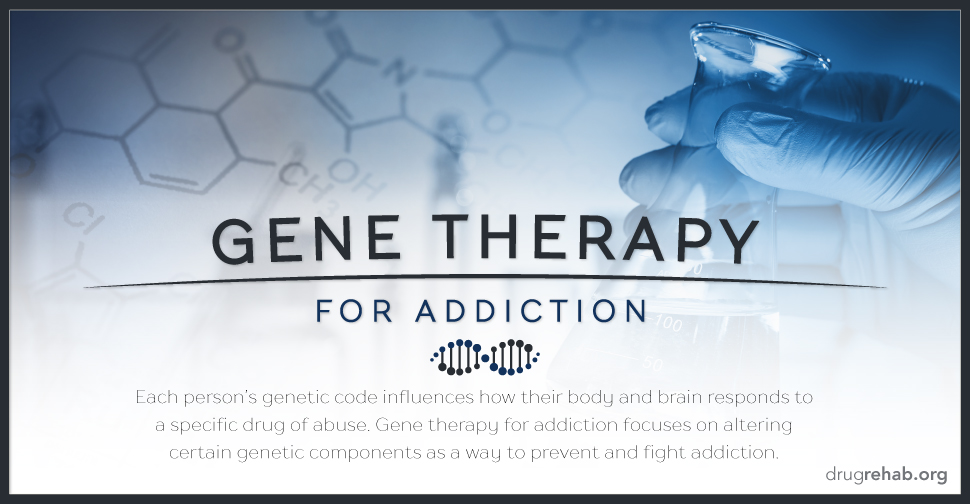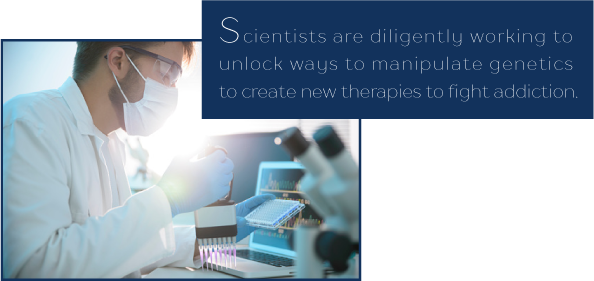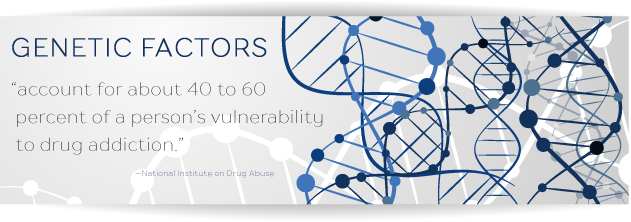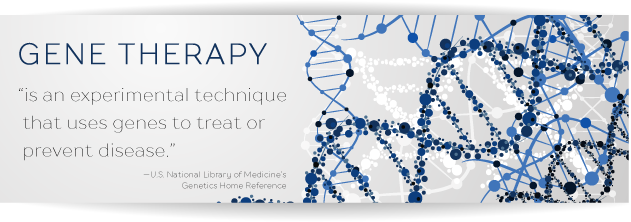
A person’s vulnerability to addiction is based on certain developmental, environmental, and genetic components. Each person’s genetic code influences how their body and brain responds to a specific drug of abuse. Gene therapy for addiction focuses on altering certain genetic components as a way to prevent and fight addiction.
Scientists are diligently working to unlock ways to manipulate genetics to create new therapies to fight addiction. While this may seem like something out of a science fiction movie, the technology and real world applications are closer than you think.

What Are Genes?
Experts believe that each of us has roughly 20,000 to 25,000 genes. While the majority of these genes are the same person to person, it’s estimated that less than one percent are unique to each person. Genes carry information from parents to their children. Every individual’s genetic code is like a blueprint or a how-to manual that tells our brain and body how to function.
This embedded information dictates our physical, physiological, mental, and even emotional characteristics. From small things like our hair color to a life-changing predisposition for a disease (including addiction), our genes shape who we are, for better or for worse. Our genes are also like keys—they lock or unlock helpful or harmful processes within our body and brain which impact our health and wellness.
How Do Genes Influence Addiction?
According to Dr. Joni Rutter, director of the Division of Basic Neuroscience and Behavioral Research at the National Institute on Drug Abuse “genetic factors account for about 40 to 60 percent of a person’s vulnerability to drug addiction.” Put this way, it becomes clear why it’s so important to understand and research this subject.

While addiction is a disease, its genetic makeup is far more complex than many other diseases. Some diseases result from only one genetic malfunction. Addiction, on the other hand, is like a complex, interlocking puzzle which contains many genetic pieces. Scientists are still learning exactly how our genes drive biological and molecular processes linked to addiction.
What Is Gene Therapy?
According to the U.S. National Library of Medicine’s Genetics Home Reference (GHR), “gene therapy is an experimental technique that uses genes to treat or prevent disease.” To create these therapies, scientists manipulate or alter DNA within certain genes. The GHR continues, telling us that gene therapy research focuses on several approaches, including:
- Replacing a mutated gene that causes disease with a healthy copy of the gene.
- Inactivating, or “knocking out,” a mutated gene that is functioning improperly.
- Introducing a new gene into the body to help fight a disease.
Currently, research is focused on animal test subjects such as mice or rats and not humans. Eventually, researchers hope to streamline certain methods which may be used successfully within humans. Many medicines and treatments have followed similar paths before they were able to help you or a loved one within your everyday life.
How Does Gene Therapy Work?
How do scientists change these genes? After scientists isolate a certain gene they want to alter, they work to begin changing it outside of the subject’s body. Now they have to get the genetic information into the subject. Some scientists have studied how nanotechnology might help to deliver this genetic information. Another common method of gene therapy begins with a benign virus (one which can no longer cause harm or illness).
The virus acts as a transport vehicle for the altered genetic information, carrying it to the appropriate place within the body or brain, often through injection. Once there, the genetic information is like a traffic cop—it begins to start, stop, and/or direct certain processes to create the desired outcome.

Many of the chemical and genetic components which regulate addiction reside in our brains. Dopamine is a brain chemical which stimulates the reward-processing parts of our brains. Using addictive substances creates a surge of this chemical. Prolonged drug abuse actually makes it harder for the brain to produce this chemical on its own. Certain types of gene therapy focus on helping the brain produce more of this chemical. In theory, this could decrease a user’s need for an addictive substance.
What Types Of Addiction Could Gene Therapy Treat?
Because research is still progressing, it’s not certain what drugs of abuse these methods might target down the road. But scientists are hopeful these methods may someday be able to treat many aspects and types of addiction. One major focus is on turning off the pleasurable or rewarding effects of a drug so that a person doesn’t desire to keep using them.
Current research outlines some possible applications for these therapies:
Cocaine
One study outlined how an altered gene could be used to prevent relapse. Once within our bodies, this gene would produce a variant of a naturally occurring enzyme called BChE. This enzyme splits cocaine into “two harmless compounds.” According to NIDA this action “will prevent euphoria, reduce motivation for subsequent cocaine use, and shield the patient from the cocaine’s toxic and addictive effects.”
Methamphetamine
Researchers at the University of Arkansas for Medical Science conducted a study on viral-delivered gene therapy on mice. These “antimeth antibody-based therapies” isolate and block the meth from reaching the areas in the brain where the drug works to create a high.
Alcohol
Another study found that a certain gene turned off an enzyme which metabolizes alcohol. Without it, a person would experience very uncomfortable effects when they drank. This gene decreased what was essentially binge drinking by half in rats who had been bred to be heavy drinkers. Scientists believe that while this method may not create full abstinence, it could be useful in harm reduction in social drinking.
ScienceDaily reported on another study led by the U.S. Department of Energy’s Brookhaven National Laboratory. It used genetic therapy to increase dopamine receptors within rat subject’s brains. This method showed favorable results in regards to both alcohol and cocaine. In the latter, self-administration of cocaine was reduced by 75 percent. ScienceDaily reported that the study’s lead author Panayotis Thanos “hypothesized that the same would hold true with other addictive drugs.”
Is Gene Therapy Used Within Addiction Treatment?
Currently, gene therapy is not used within addiction treatment. The genetics behind addiction are so complex that these therapies are still within the research stages. The GHR cautions that gene therapy “remains risky and is still under study to make sure that it will be safe and effective.”
In 2014, NIDA’s Dr. Rutter maintained that “using gene therapy to actually treat drug addiction is a long way off, however, and probably not a main goal.” This does not mean that research on the subject won’t continue. In time, some of these methods may be refined and adapted as treatments which target addiction in humans.
We Can Help You Find Evidenced-Based Treatment
While gene therapy may not an option at this time, there are many other evidence-based addiction treatment programs that exist. Every person has different needs within treatment, and we can help you to identify these and create an individualized recovery plan. Contact one of our treatment specialists today.
For More Information Related to “Gene Therapy For Addiction” Be Sure To Check Out These Additional Resources From DrugRehab.org:
- Social Learning Theory Of Addiction Treatment
- How Do I Get My Loved One Into Rehab?
- Drug Addiction And The Brain
- The Causes of Addiction – Genetic, Learned, or Both?
- Is Drug Addiction Hereditary?
- Are Babies Predisposed To Drug Addiction?
Sources
U.S. National Library of Medicine — What is a gene?
National Institute on Drug Abuse — Dr. Joni Rutter Q&A: How Basic Science Is Tackling Addiction

